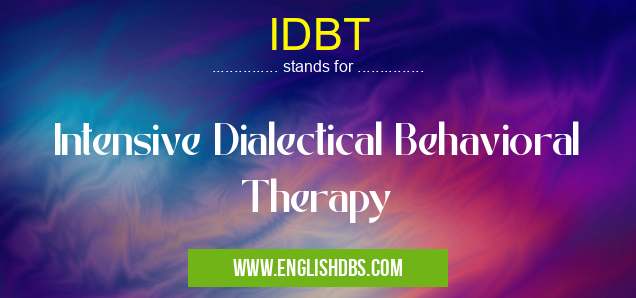What does IDBT mean in THERAPY
Intensive Dialectical Behavioral Therapy (IDBT) is a specialized form of psychotherapy that effectively treats individuals with severe mental health conditions. Based on the principles of Dialectical Behavioral Therapy (DBT), IDBT provides intensive support and skills training to help individuals manage their emotions, behaviors, and relationships.

IDBT meaning in Therapy in Medical
IDBT mostly used in an acronym Therapy in Category Medical that means Intensive Dialectical Behavioral Therapy
Shorthand: IDBT,
Full Form: Intensive Dialectical Behavioral Therapy
For more information of "Intensive Dialectical Behavioral Therapy", see the section below.
IDBT Meaning in MEDICAL
In a medical context, IDBT is a highly structured and evidence-based therapy used to address various mental health conditions, including:
- Borderline Personality Disorder (BPD)
- Self-Harm and Suicidality
- Substance Abuse
- Eating Disorders
- Chronic Depression
IDBT Full Form
The full form of IDBT is Intensive Dialectical Behavioral Therapy.
What does IDBT Stand for
IDBT stands for:
- Intensive: Involves frequent therapy sessions (multiple times per week)
- Dialectical: Blends acceptance and change strategies
- Behavioral: Focuses on learning and practicing new skills
- Therapy: Provides a safe and supportive environment for growth
Essential Questions and Answers on Intensive Dialectical Behavioral Therapy in "MEDICAL»THERAPY"
What is Intensive Dialectical Behavioral Therapy (IDBT)?
IDBT is a comprehensive treatment program designed for individuals struggling with severe and persistent mental health issues, such as borderline personality disorder (BPD) and suicidal ideation. It combines elements of cognitive behavioral therapy (CBT) and dialectical behavior therapy (DBT) to provide intensive support and skills training.
Who is IDBT suitable for?
IDBT is most appropriate for individuals who have not found adequate relief from traditional outpatient therapy or who require a more structured and intensive level of support. It is particularly beneficial for those struggling with self-harm, suicidal thoughts, and emotional instability.
What are the key components of IDBT?
IDBT typically includes the following components:
- Individual therapy sessions: Focus on developing coping mechanisms, reducing distress, and improving interpersonal relationships.
- Group therapy sessions: Provide a supportive environment for sharing experiences, practicing skills, and challenging negative thought patterns.
- Skills training groups: Teach participants practical techniques for managing emotions, reducing self-harm, and coping with interpersonal conflicts.
- Phone coaching: Offers immediate support and guidance during challenging times.
What are the benefits of IDBT?
IDBT has been shown to be effective in reducing symptoms of BPD, decreasing suicidal behaviors, improving emotional regulation, and enhancing interpersonal functioning. It can also help individuals develop healthier coping mechanisms and build stronger relationships.
How long does IDBT typically last?
IDBT programs typically last for 6 to 12 months, depending on the individual's needs and progress. Participation in the full program is essential for optimal outcomes.
Is IDBT covered by insurance?
Insurance coverage for IDBT varies depending on the plan and provider. It is recommended to contact your insurance provider to determine your coverage options.
Final Words: Intensive Dialectical Behavioral Therapy (IDBT) is a comprehensive and effective treatment for individuals struggling with severe mental health challenges. By providing intensive support, skills training, and a collaborative approach, IDBT empowers individuals to manage their symptoms, improve their relationships, and live more fulfilling lives.
